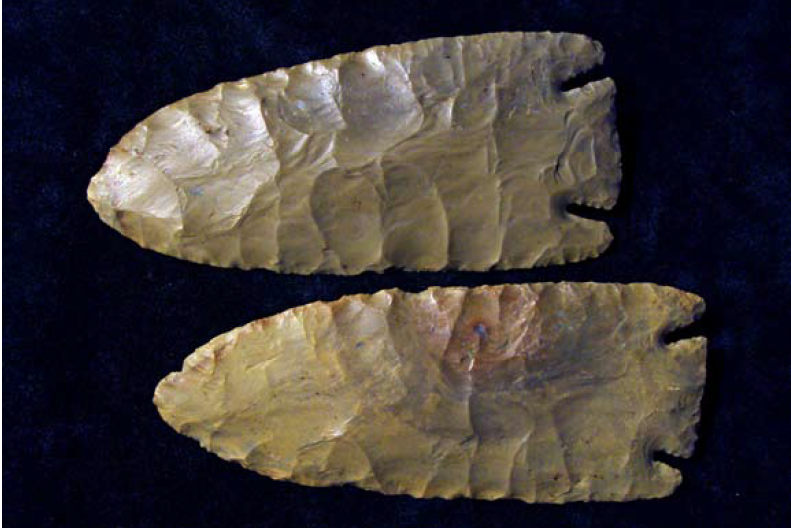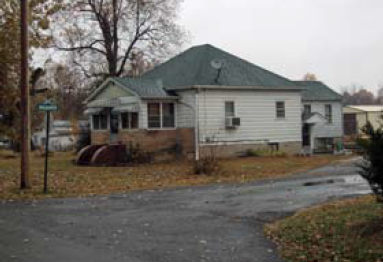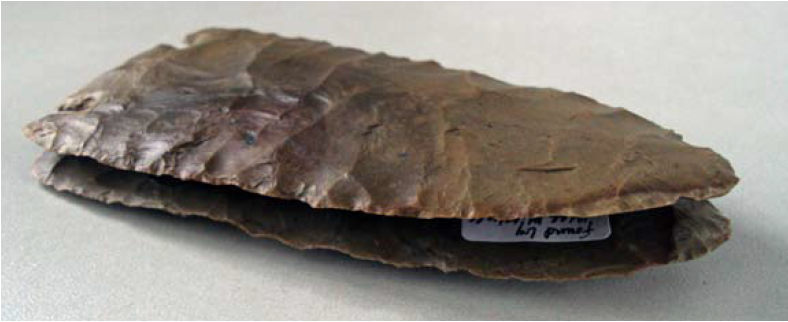
Denny Moore was in his nineties when I finally met him. Our
brief visit would last about an hour, and then I would see him no more. Dressed
in stripped blue pajamas, he sat in the silence of his dining room,its only
light being the grey tint of an October day. His frail body seemed cocooned
within an oversized chair, whose pillowed arms pressed upon him. Clean and
well kept he appeared, and his home was spotless. When he spoke, his voice
projected a sense of serenity, and although blind for some twenty years now,
his mind was razor keen, ever sharpened from the loss of sight.
He was the last of the old-time Indian relic collectors from southeastern
Illinois. A man who recalled with precise detail all those who had shared
his same passion for artifacts, but were now, all gone. Each one had beaten
him to life's finish line, but Denny remained still. Denny remained with
a memory full of fascinating stories and anecdotes of pursuing the bounty
of prehistory... a bounty offered by the land between two great rivers.
I had learned of Denny Moore from a fellow collector who had sold me two,
fine flint blades from Saline County. Twenty years before, he had purchased
the relics from Denny, "an elderly gentleman from Carrier Mills who
was going blind." My friend had typed up a beautiful provenance, with
photos, and presented it when he brought out the points. The sizable notched
blades looked to be crafted from the same nodule of heat-treated Dongola
hornstone, and were two of a three blade cache, the third having been found
broken, and tossed aside in some dusty drawer, probably deemed unworthy for
display.
Where was that third blade?
The silly notion was ignored for a time, but curiosity, like a restless
sleeper, forever stirs. There would be no peace until I tried to find that
missing blade, so I picked up the phone book, and there at 1010 N. Main,
in Carrier Mills, IL, just as the provenance had stated, Denny Moore, was
still listed. Could it be, after twentyone years, Denny Moore was still alive?
One of Denny's caregivers answered the call, and when she handed Denny the
phone, I sensed his excitement when I mentioned Indian artifacts. Then, his
voice rose yet again, when I asked about the blades. "I got the third
one around here somewhere. Corner's knocked off it. C'mon over an I'll give
it to ya." Denny proposed.
Thirty minutes later, as I approached the door at 1010 N. Main, the caregiver
peered sheepishly though the window and motioned me to the side entrance.
Puzzled, I stepped around the house, found the caregiver fumbling to secure
the screen door lock, then asking me to "wait at the door". She
first needed to make a phone call to Denny's daughter, who might then permit
my entry.

"You can come in." she nodded, when she finally returned.
I entered to the sound of an old mantle clock, whose "tick…tock" echoed
through rooms like some lonely mantra.
"He's right through the kitchen, there in the dining room, in his chair." she
pointed with a whisper. Denny remained seated, almost Zen-like, and stared
straight ahead as I approached through the kitchen and from his side. When
I stood before him, I reached for his hand and gently shook it. Then, introducing
myself, I sat to enjoy one of the most satisfying hours of my collecting
experience.
It was then that Denny relayed a brief story to me.
Around 1940, just south of Carrier Mills, a young woman named Mae Mitchell
loved to pick up Indian rocks on Charlie Harris's farm. Sometimes he let
her hitch a wagon ride to the field where his plow horses turned over the
black earth, allowing Mae the thrill of another hunt. Now and then, as Mae
stumbled through the pungent, earthy steam of the furrows, she would spot
another beautifully crafted arrowhead that elated her with a feeling like
no other. One particular day while Charlie labored with the team, the plow
spilled out the fabulous three blade cache that rewarded Mae with her most
treasured find.
Mae Mitchell cherished her three blade cache for many years, and each time
she showed it off, every detail of the fantastic discovery was relived again.
Decades passed, and when Mae was beyond her prime, and well into her waning
years, she survived the grueling winters with the help of a compassionate
neighbor, who kept her stoker full of coal, and removed its ashes when necessary.
That kind soul was Denny, and one morning after he spared her the filthy
rigors of attending the old furnace, Mae appeared from behind the corner
of the garage and handed him the three blades.
"Take these, Honey. I ain't got much, but I know you've always fancied
these spears," she said with a forlorn look that startled the man. He
dropped the coal bucket as she made him grasp the blades and then, wrapping
her hands around his, she affectionately looked into his eyes and patted
the back of his hand. "You take'em Denny, and don't say noth'in! I couldn't
make do without you."
This little tale and a few others are a sampling of what the sightless rock
hunter shared with me that afternoon. I learned about all the old rock hounds
whose names I had heard for years, but who had succumbed to life's finality…their
unique discoveries all dispersed, with little regard for a lifetime of effort.
The joy that exuded from my new friend as he spun his yarn of tales was in
itself worth the afternoon's trip. Oh yeah, and about the third blade, it
was probably somewhere in Denny's home, but it wasn't in the living room's
curio cabinet like he thought, and that was the end of that! So it really
didn't matter at that point, and though I tried to appear indifferent, inside,
I was not.
Looking back on our meeting, I now realize Denny's true gift that afternoon.
The fact that he was willing to give up the third blade, and accommodate
the desires of a complete stranger, is the measure of a dear man's soul.
That he would come to the aid of his aging neighbor in her time of need,
is the sign of one who places others above himself and expects no reward.
To accept with grace and dignity, the existence his last years would deal
him, without possessing a single resentful or cynical thought, was the demeanor
of a man who was comfortable within himself, a man who had indeed, triumphed
life.
A selfish incentive motivated me to call on Denny that afternoon, but it's
clear now the short visit proved more valuable than any measure of material
or monetary gain. That day, Denny Moore taught me an important lesson in
the art of living.
Originally published in Springhouse Magazine Volume 27 Number 6 Used by
permission





